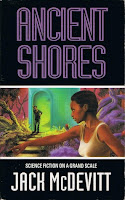My final reading for 2015 was Jack McDevitt's latest novel, Thunderbird. It will be my pleasure to review it -- spoiler-free.
Thunderbird is the sequel to McDevitt's 1996 novel
Ancient Shores (that I haven't read, and that was absolutely no problem). In the first book, an ancient portal to other -- and unidentified -- worlds was unearthed on territory within North Dakota administered by a Sioux tribe. Confrontation between the federal government and the Sioux has left the portal under the control of the latter.
Thunderbird opens soon after that confrontation.
Much SF has us live vicariously through the actions of heroes, military figures, spies, wily con men, and/or people driven to uncharacteristic action by desperate circumstances. (Certainly two SF sagas with a superficial resemblance -- Hollywood's Stargate franchise and Frederik Pohl's
Gateway and its sequels -- are within that tradition.)
Thunderbird does not.
By the simple but elegant device of locating the the teleportation portal where he did, McDevitt makes
his story about everyday people. Yes, the occasional outside expert (not that there are any true experts on teleportation and other worlds) is brought in, but decisions are mainly in the hands of the Sioux leadership and the ordinary people who happen to live in the nearby towns. (One notable exception is the president, who is revealed to be as conflicted and torn as anyone, while others try to sway his opinions.)
Would I have made the same decisions -- about what to explore, or not to explore; what gear to bring along, or to leave behind; in my reactions to various seen and suspected aliens -- as did the main characters? Maybe not. In fact, probably not. And that, IMO, is the point of the novel.
Bottom line:
Thunderbird is a fun, fast-reading, and thought-provoking book.



































No comments:
Post a Comment